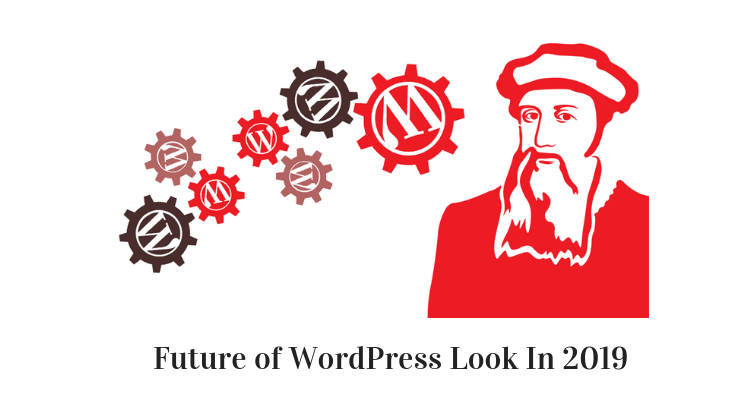How Will Future of WordPress Look In 2019
WordPress website development has grown to be the first choice of the majority of people looking for attractive and productive virtual interfaces. Since its inception in 2003, the open source CMS has undergone a lot of changes and has evolved into a large platform that can be used for creating all types of websites. The initial years saw the introduction of search engine friendly features followed by the emergence of widgets, improved security measures and conveniences of auto-updates and easier method of embedding videos. Later, the platform adopted responsiveness, effortless editing in addition to e-commerce integration and it can be safely said that each update makes it better and bigger. The next version of the CMS, WordPress 5.0 is going to be released in a few weeks and it’s a good time to discuss how the future of WordPress will look after the update.
1. Gutenberg Redefines WordPress Design
The default visual editor of WordPress has not changed a lot over the years and though undoubtedly convenient, its dependence on HTML and shortcodes proved to be a hindrance of for some users, especially amateurs. The introduction of Gutenberg, a block-based page builder is a refreshing change and this new tool can be used for creating media-rich posts as well as pages. It gives the user more control over the design of the website besides making the process easier as virtually no code is required to make the modifications. Developers were already using third-party visual page builders and once Gutenberg replaces the current editor and is made the default inbuilt tool, they would not need to install any other service for creating attractive pages. The question arises now is how compatible it is going to be with the existing functionality and the team behind the innovation assures people that there will be transition paths for shortcodes, custom post types, and meta boxes. With a practical, user-oriented editor being provided as part of the standard package, WordPress design will be redefined in more ways than one and the platform will only become more popular.
2. Methods Other Than Plugins To Add Functionality
One of the biggest attractions of WordPress was the ease with which a person can easily extend the functionality of an interface by using plugins. In case, a feature was not already available in the core programme or the theme being employed for building the website, it could simply be added by integrating a plugin. The future though will see the addition of functionalities through methods other than plugins like using the REST API to run an application on a WordPress website. In fact, Gutenberg has been created on GitHub with REST API, JavaScript and React. Representational State Transfer, REST or RESTful API lets developers use existing protocols so that they can add WordPress content on other apps before assimilating them into a website. Moreover, many existing page builders have a lot of pre-loaded features which were earlier possible only by adding a plugin to the website. In 2019, we will see an increasing number of interfaces with functionalities that were incorporated through other methods rather than by integrating plugins.
3. Automated Tools Will Ensure Website Security
The future of WordPress will be even more safe with the entry of Artificial Intelligence (AI) in the realm of website security. Tide, which is a sequence of automated tests which check all plugins and themes for PHP compatibility is going to be introduced shortly. Currently, users had to take some necessary steps in order to secure their interfaces such as creating backups, updating themes plugins or the core program etc. but in times to come, the procedure will become simpler with more and more tools for monitoring vulnerabilities. The other big development that is going to affect WordPress web development is the introduction of General Data Protection Regulation (GDPR) in the EU which focuses on privacy and safeguarding of critical personal information of all individuals. The WordPress core has assembled a team to help people with GDPR compliance and not only websites but plugins and any other element dealing with personal data must also be in accordance with the regulations. Most reputable developers are already taking the necessary steps like WooCommerce has started incorporating the features before the release of its next version.
4. The Platform Will Provide Better User Experience
WordPress will continue to support the mobile-first approach towards web development and initiatives like Accelerated Mobile Pages (AMP) project will gain more traction. This will lead to the creation of responsive themes with even more robust features helping in building faster interfaces that will perform optimally on all types of devices and screen sizes. Virtual Reality is another trend that will be seen in theme development apart from more image-based templates hoping to build up engagement with the user. People can also expect to see more features like shopping carts and checkout procedures being pre-built into themes. All these indications point towards one thing only, that the open-source platform will provide even better user experience than it is providing at present.
Conclusion
The ever-growing community of developers and users will ensure that the future of WordPress remains bright and the platform will become even more dynamic and secure and go from strength to strength in the times to come.
About Author
Brandon Graves is a WordPress expert. His specialties include WordPress design and development services like migrate website to wordpress, custom WordPress solutions, blogging, content strategy, etc











I’m now not sure the place you are getting your info, however good
topic. I must spend a while finding out more or working out more.
Thanks for excellent info I used to be searching for this information for my mission.